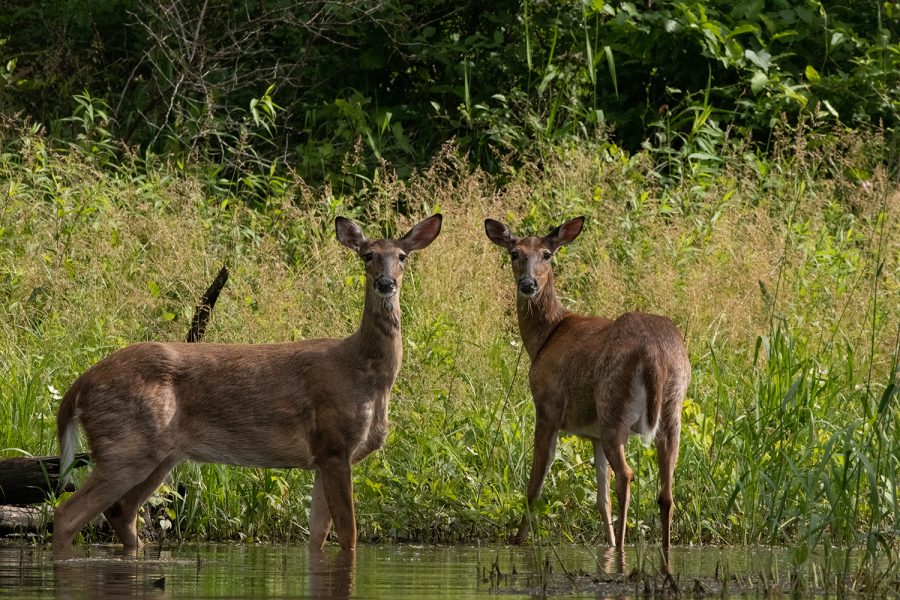Iowa City Deer Friends file petition asking for stay of upcoming deer bow hunt
Bowhunting to control deer in Iowa City begins on Oct. 1 and lasts until Jan. 10. Members of IC Deer Friends spoke at a city council meeting on Aug. 31 in opposition to the hunt.
A pair of deer stand along the riverbank of the Iowa River north of Iowa City on June 11, 2019.
September 26, 2020
The Iowa City Deer Friends are taking legal action against the City of Iowa City, filing a petition on Thursday asking for a stay of the upcoming fall bowhunt meant to cull deer as a part of Iowa City’s deer management plan, which would begin on Oct. 1 and end on Jan. 10.
The petition argues that the City of Iowa City has acknowledged deer population is likely already below the target number making a bow hunt this fall unnecessary, and that the bowhunt in its current form is not regulated well enough to prioritize public safety.
The statement in the petition saying the city has acknowledged deer population as being under target numbers references a letter sent by Iowa City City Manager Geoff Fruin to the Iowa Natural Resource Commission in May after last year’s winter sharpshoot conducted by wildlife management organization White Buffalo.
In the letter, Fruin said White Buffalo culled 500 deer across Iowa City.
“As the White Buffalo, Inc. report states, the deer population likely is under our goal of 25 deer per square mile,” Fruin said in the May letter. “As a result, City staff believes 75 tags will be sufficient to manage the deer population. With that said, we plan to partner with the DNR to conduct an aerial deer count next winter, which will provide needed data to assist us in our ongoing challenge of managing Iowa City’s deer population.
The Iowa City City Council voted 5-2 in favor of holding a fall bowhunt in its Sept. 1 meeting, with City Councilor Mazahir Salih and Councilor Pauline Taylor being the two dissenting votes.
Related: Iowa City deer management continues to draw controversy among residents
The city council then voted 4-3 on the same day in favor of the current rules and regulations of the bowhunt, with the three dissenting votes being City Councilors Salih, Taylor, and Janice Weiner.
IC Deer Friends member Laurie Crawford has attended previous city council meetings advocating for alternative methods of controlling the city’s deer population, and was one of the members who helped compile the information for the petition.
In a press release supplementing the petition, Crawford said the rules and regulations guiding the bowhunt are not strict enough and pose a public safety risk to the residents of Iowa City.
“The hunt rules allow for hunters to shoot very close to adjacent properties, and then follow wounded deer through neighboring yards in order to kill the deer, effectively guaranteeing there will be strangers with weapons entering private properties without permission,” Crawford said. “There are safer methods of changing deer behavior and affecting the population numbers, so there’s just no reasonable cause to hold this hunt.”
Crawford added that while the city council did work with the IC Deer Friends on some aspects of the bowhunt, it didn’t follow through with parts of the long-term deer management plan the city put in place last year that is applicable from 2019 to 2024.
“The plan required public input that required a website for them to set up for complaints,” Crawford said. “And they just didn’t do any of it.”
Iowa DNR Wildlife Biologist Andy Kellner said Iowa could biologically support a large deer population, but not managing that population could present an issue when society begins to be adversely affected by significant numbers of deer.
“I think left unchecked what you’re going to see is other things start taking away from the deer population,” Kellner said. “So that’s going to be things like we’re going to see a spike in vehicle accidents, or a spike in disease in the deer, or malnutrition at some point. Let’s say somebody’s feeding the deer and then all the sudden, that’s a source for disease because they’re sharing saliva.”
Crawford said she expects the court to rule in favor of the petition.
“I would be surprised if the court didn’t grant relief,” Crawford said.



